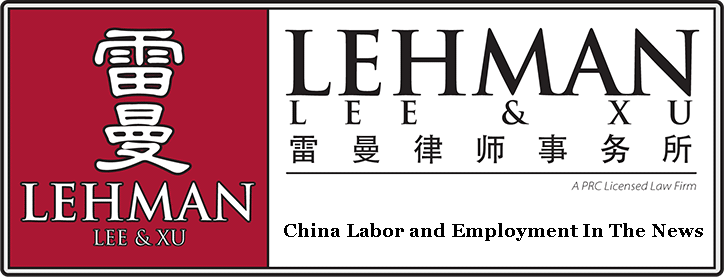On June 30, 2012, China's Ministry of Public Security announced a significant new immigration law, the "Exit-Entry Administration Law", scheduled for implementation by July 1, 2013.
While final, official protocols and regulations have yet to be announced, companies and assignees should be aware that during the next 12 months, the Chinese Government may phase-in changes to the new master immigration law.
The new law is a combination of two, current laws for foreign nationals and for Chinese nationals.
According to a recent interview by China's official press agency, Xinhua, the Public Security Bureau (PSB) is introducing the new law to make, "Innovations and improvements in exit-entry administration organizations, systems and mechanisms.
“It contributes to the strengthening and improvement of exit-entry administration work by Public Security organs. It heightens the requirements for administration and law enforcement by Public Security organs."
The emphasis of this new law is two-fold: increased immigration enforcement over foreign visitors and worker/residents and increased scrutiny by the Overseas Chinese Affairs Department in administering matters for overseas Chinese, particularly for returning-resident Chinese.
In general, the major points for companies and assignees considered for implementation under the new master law are as follows:
Increased Border Control:
- Gathering of biometric data/personal appearance requirement at specific Chinese consular posts for certain nationalities
A recent update from PLG's China office indicates that certain EEA nationals will no longer be eligible for expedited or same-day visa application processing with the Commissioner's Office of China's Foreign Ministry in Hong Kong. As visa applications for certain EEA nationals will be more closely scrutinized when applying in Hong Kong, these applicants should expect an increased processing time of four business days instead of one;
- Foreign nationals found to be in violation of their condition of stay can face summary deportation and be barred from re-entering China for up to ten years
- Greater information sharing between the PSB's, MOFA and Chinese consular posts to confirm accuracy of visa information supplied by visa applicants and to ensure compliance by all visa holders
Increased Enforcement Policies:
- Assignees found to be in violation of their condition of employment or failing to carry proof of valid employment status may face a civil fine of up to RMB 20,000 (approx. US$3,170) and a possible criminal penalty of detention
- Any foreign national, inclusive of visitors, found in violation of condition of stay may face a civil fine of up to RMB10,000 (approx. US$1,590) and possible detention of up to 15 days
- All foreign nationals, regardless of visa category, will be required to register their presence with the local PSB Office within 24 hours of arrival in China. While this is a current requirement, enforcement will be enhanced as a result of increased spot-checks of foreign nationals. Re-registration is, and will be, required for each new entry to China
- Chinese employers knowingly hosting illegal foreign workers may face civil fines of up to RMB10,000 (approx. US$1,590) per worker, with a total, maximum fine of RMB100,000 (approx. US$15,900). In addition, any company profit derived from such employment will be subject to forfeiture to the Chinese Government
- Chinese employers found to be in non-compliance (e.g., preparing fraudulent or inaccurate host invitation letters, submitting inaccurate work and residence permit applications) may face civil and criminal penalties
New Policies:
- An assignee's Employment and Residence Licenses will be issued for a minimum of 90 days up to a maximum of five years
- Residence Licenses for accompanying family members will be issued for minimum of 180 days up to a maximum of five years
- Any visa valid for a stay of up to 180 days will require the visa holder to submit an extension application to the local PSB no later than seven days from date of the initial visa's expiration
- "Ordinary" visas (e.g., visas for visit or work) will be considered for extension on a discretionary basis
- Employment of any foreign national, including foreign students enrolled in Chinese universities, must be reported in a timely fashion to the Labor Office and PSB. Chinese citizens are also encouraged to inform their local government of any suspected failure by a Chinese company to report the presence of foreign workers
- "Skilled Talent" and "Outstanding Alien" Visas will be offered to foreign nationals considered to have specialized or shortage-occupation skills or recognized by a Chinese Government authority as possessing exceptional and internationally-recognized expertise/skills
- New Permanent Residence system may open more paths to non-immigrants to apply for unlimited stay in China. Currently, paths to Chinese permanent residence are fairly restricted to such cases as foreign dependents of Chinese nationals, outstanding workers and wealthy individual investors
Action Items For Employers
Presently, specific requirements to implement the proposed new law have not yet been formulated. However, companies and assignees should be aware that implementation of these changes may be phased-in over the course of the coming year versus waiting until July 1, 2013.
As more immigration compliance will be expected from Chinese host companies, it is recommended that Chinese HR be made aware of these and other proposed changes according to the PSB's recent announcement
Web link: http://www.relocatemagazine.com/immigration-a-visas/immigration-a-visa-news-main/5360-proposed-new-exit-entry-law-in-china

